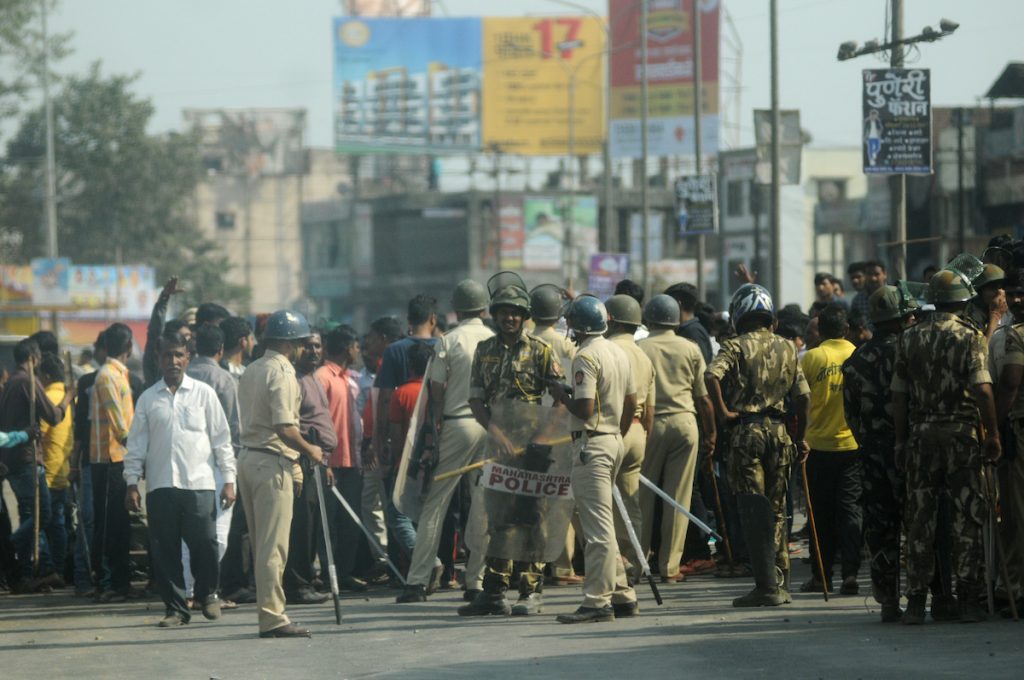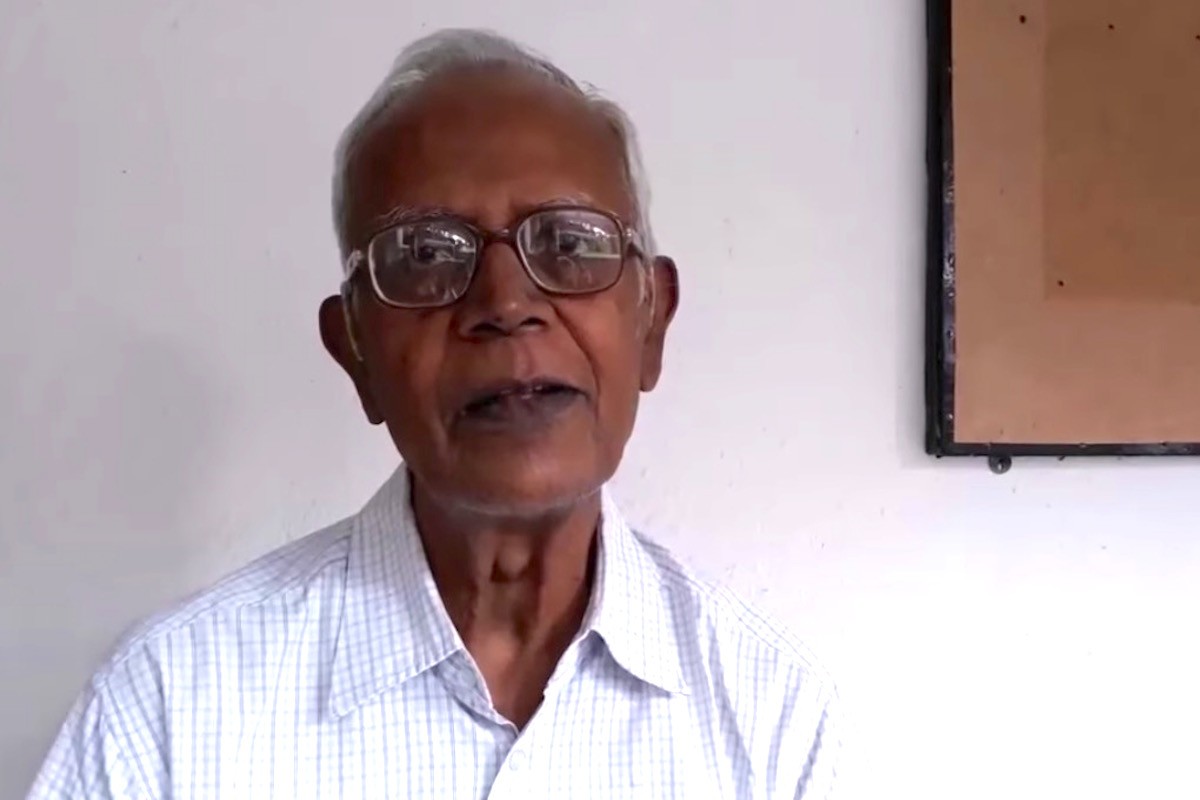Social activist and Jesuit priest Father Stan Swamy was arrested in Ranchi, capital of eastern Indian state of Jharkhand, on Oct. 8 by detectives from the National Investigation Agency (NIA). They arrested the 83-year-old over his alleged links to Maoists rebels and in connection to a 2018 incident of caste-based violence known locally as the Bhima Koregaon case. Father Swamy denies the allegations.
Father Swamy was arrested at his residence at the Jesuit owned Bagaicha social center and then taken to Mumbai where a special court remanded him in judicial custody till Oct. 23. He is currently being held in Taloja Jail near Mumbai.
His lawyer Peter Martin said: “We are worried about him. Father Stan Swamy is very old and has several health problems.”
Siraj Dutta, who is associated with the Jharkhand Janadhikar Mahasabha, a coalition of progressive organizations, said that the NIA team, questioned the elderly priest for about half an hour after reaching his office. “The officials in the NIA team did not even show any warrant to arrest or search,” Dutta said.
“There was no transparency in their actions and they took Swamy to the NIA’s camp office and after several hours handed him an official letter of arrest,” he added.
‘False allegations’
Two days before his arrest Father Swamy issued a statement via video where he said that the NIA had been making false allegations against him.
In the video Father Swamy said that he had filed a case in the Jharkhand High Court on behalf of 3,000 young Adivasis (people who belong to indigenous South Asian tribes) who have been incarcerated in prison. He said this had become a “bone of contention” for the state who he said now wanted him “out of the way.”
He said the NIA had already interrogated him between July 27 and 30 and again on Aug. 6.
“During interrogation, the NIA officials showed me several documents which allegedly reveal my relationship with the Maoists,” Father Swamy said.
“NIA officials showed some so-called documents and extracts taken from my computer. I told them that this was a conspiracy and these documents were fake and fabricated and I disowned them,” he said.
“The latest investigation by the NIA has nothing to do with the Bhima Koregaon case in which I have been accused. The NIA wants to prove my links with the Maoists. It is not true, and I have denied such charges,” he said.
“I just want to say that what is happening with me today is happening with many other people as well. Social workers, lawyers, writers, journalists, student leaders, poets, intellectuals and many other people, who are working for the tribals and the underprivileged and disagree with the ideologies of the current regime of the country, are harassed and often implicated in fake cases,” he added.
The NIA has booked Father Swamy under sections of anti-terror law the Unlawful Activities Prevention Act (UAPA).
The ruling Hindu nationalist Bharatiya Janata Party (BJP) government led by Narendra Modi last year amended the UAPA that was enacted in 1967. Opposition parties and social organizations strongly opposed the amendment and claimed that not only institutions but also individuals could also be declared as terrorists following the amendment. Many left-wing intellectuals critical of the government have been arrested under the law.
Father Swamy is the 16th person to be arrested over the Bhima Koregaon case with those accused being booked under various sections of the Indian Penal Code and the UAPA.
The Bhima Koregaon case was a 2018 attack on visitors during an annual gathering at Bhima Koregaon village in Maharashtra’s Pune district to mark the 200th year of the Battle of Bhima Koregaon. On Jan. 1, 1818, soldiers of the East India Company, along with a large number of ‘Mahars’ or leather workers, defeated a much larger force of the Peshwa Baji Rao II. Since then, on each Jan. 1 Dalit people, or so-called members of depressed classes, assemble at Bhima Koregaon to commemorate their victory against the upper caste Peshwa regime of the Maratha Empire.

Investigators said speeches made at the event, which was purportedly funded by Maoists, triggered caste clashes near Bhima Koregaon village on Jan. 1, 2018. An NIA official said that Father Swamy had been arrested in connection with the violence.
Well-known social worker
Father Swamy has been vocal for the rights of tribal people or indigenous forest dwelling communities and the poor and marginalized sections of society in Jharkhand, a state with high levels of poverty. He has publicly been against amendments in the land acquisition law by the national BJP government that make it easier for government to acquire land belonging to indigenous communities.
He opposed the setting up of a land bank by the former BJP government of Jharkhand that facilitated the acquisition of the land belonging to farmers and tribals for industrial and development purposes and worked to promote social justice and the emancipation of the disadvantaged groups.
The priest also opposed the overexploitation of resources by corporations, attempts to vilify indigenous forest dwellers and those activists fighting for them by falsely tagging them as far-left Maoists, locally known as Naxalites who have waged an armed struggle against the Indian state for five decades.
Bishops and others condemn arrest
The Catholic Bishops Conference of India (CBCI) has condemned the arrest and jailing of Father Swamy with its secretary general, Archbishop Felix Machado, appealing for his immediate release.
“It is difficult to comprehend the plight of an octogenarian with several morbidities, like Stan Swamy to have to undergo such difficulties during this pandemic in which even a normal healthy person would hesitate to travel or would never travel or would never travel risking one’s life,” said Archbishop Machado in a statement.
Jharkhand’s Chief Minister Hemant Soren of the regional political party Jharkhand Mukti Morcha (JMM) has criticized the arrest and said that all voices of dissent in India are being stubbornly crushed.
Soren said the federal BJP government was bent on silencing those speaking for the poor, forest dwellers and the deprived. The Hindu nationalist BJP was voted out of power in Jharkhand in December 2019 and currently a secular alliance of the JMM and Congress is in power.
Activist Harsh Mander said the arrest and charging of Father Swamy with a Maoist conspiracy were ridiculous.
“Swamy opposed the government’s support to big industries at the cost of tribals and had to pay for this,” Mander said.
Mervyn Thomas, founder of Christian Solidarity Worldwide, said his organization had grave concerns about how the Indian authorities are handling of their investigations in relation to Father Swamy and their heavy-handed approach towards a human rights activist who has long spoken out for the rights of the tribal community.
“We are seeing a worrying trend in India today where voices speaking out for truth and justice are being suppressed,” Thomas said.
“The government either condones or is directly responsible for unlawful and unreasonable treatment of those who speak out on violations in India,” he said.
Human rights organization People’s Union for Cities said the NIA was stifling dissent as Swamy had consistently questioned the misuse of power by the state and the police while he worked dedicatedly and steadfastly for the marginalized sections.
Nearly 2,000 Indian activists, journalists, former bureaucrats and members of civil society have also denounced the arrest of Father Swamy. In a joint statement, they said that the arrest of an 83-year-old cleric during the COVID-19 pandemic was atrocious and vengeful.







